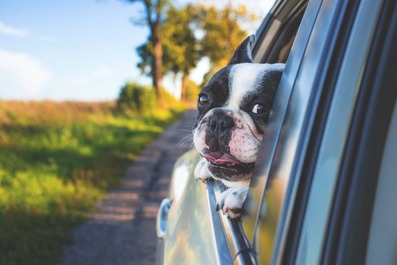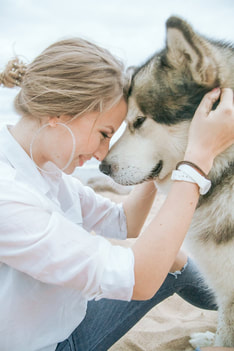By: KimberlyLike most pet owners, I consider my cat, Scout, to be a member of the family and would gladly spend whatever it takes to get her the best medical care possible. This is why I made the decision to get pet insurance several years ago and it was one of the smartest decisions I’ve made when it comes to pet care. A survey by the Associated Press showed that approximately 41% of pet parents worry that they might not be able to afford medical bills for their pet. This begs the question … is pet insurance the answer? The response depends on many factors. Purchasing pet insurance is both an emotional and financial decision. The purpose of pet insurance is to shield owners from steep vet bills when their pets gets injured or sick. When making the decision about whether or not to get pet insurance, there are a few questions to contemplate. How much would you be prepared to pay if your pet had a medical emergency, how much could you afford to pay and how much resilience do you have for risk? The cost for a routine check-up might not break the bank, but more serious health problems, tests, surgeries and medications do add up! So I say, if you wouldn’t be able to afford a major medical procedure and you don’t want this to be a factor in deciding your pet’s fate- get the insurance. After pretty extensive research, I found that the average cost for a plan with pretty decent coverage is around $50 per month. I pay a bit more, but I have a “senior citizen” kitty and like with insurance for humans, the older you are, the higher the premium. You’ll get the lowest price if you buy when your furry friend is young. Pet insurance works differently than our health insurance. Typically companies that cover humans pay for medical expenses up front, whereas pet insurance companies require you to pay medical bills and then submit a claim for reimbursement. My advice would be to do your research and really pore over the details of each plan and read the fine print of the policy. I also suggest asking the company as many questions as you can so that you know what's covered (and what's not). Some key questions to ask: 1.) Is there a physical exam required to get coverage? 2.) Is there a waiting period? 3.) What percentage of the bill do they pay — after the deductible? 4.) Are payments capped in any way? 5.) Are there co-pays? 6.) Does the plan cover pre-existing conditions? 7.) What about chronic or recurring medical problems? 8.) Can you choose any vet or animal hospital? 9.) Are prescription drugs covered? 10.) Are you covered if you travel with your pet? 11.) Does the policy pay if your pet is being treated and dies? If you’re in the market for pet insurance, Investopedia has a great breakdown of the nine best insurance plans of 2020. You should have an idea of exactly what you want the plan to cover. You should also consider your pet’s genetic and medical history when selecting a plan. If you have a dog breed, for example, that is prone to certain conditions you should keep this in mind and look for a plan that covers hereditary illnesses. Does your pet have an issue that might reemerge? Find a plan that covers pre-existing conditions. If you’re unclear about what plan to get, I would suggest consulting with your veterinarian to get their opinion. With pets living longer these days, your chances of using pet insurance are higher than ever. At the end of the day, if you purchase pet insurance and don’t use it, consider yourself blessed!
By: KimberlyIf you are blessed enough to have a pet who has lived into their golden years, you’ve experienced the years of joy and unconditional love they’ve given you. They become our babies, confidants and our friends. Their only “downfall” is that they have a much shorter life span than their human companions. Naturally as pets get older, their needs change and evolve. It’s important to be conscious of these changes and pay attention to what your furry friend is trying to tell you. Senior citizen pets require special care and pampering! Diet As pets age, they will start to have less energy, they might develop hearing issues or cataracts and their organs may also stop functioning as efficiently. While your pet’s nutrition is always important; it is crucial to ensure that they are on an age-appropriate diet as they age. Senior pets are at higher risk for getting diabetes, kidney or liver disease or obesity. Make sure you find the best dog/cat food that is specially designed for senior pets. For dogs particularly, these are often lower in fat and have fewer calories and will complement the nutritional need of your dog. Since older pets tend to develop different conditions; check with your get to see if their is a specific type of senior food for their particular need. Animals also tend to drink more water as kidney function increases with age, so keep your pet’s water bowl filled and place several around the house. Regular Check-Ups Routine vet care is essential when it comes to caring for older pets. As our furry friends age, their immune systems before weaker which make them much more vulnerable to all sorts of ailments. Vets suggest twice-yearly checkups for older pets. Your cat or dog will get whatever vaccinations are needed and will get a physical exam, along with tests to follow up on any problems. Blood and urine tests are also recommended to gather information on kidney and liver health and thyroid hormone levels among other things. This is a good time to mention any changes you’ve seen in your pet such as drinking more water, loss of appetite, lethargy, etc. Pet insurance can be extremely helpful with veterinary bills for routine visits and most common procedures senior pets will require. While pet insurance is more expensive as pets age, it’s a good idea to get a plan at some point. ASPCA Pet Health Insurance offers a variety of plans for pets of all ages that can help ensure your pet’s golden years are the best they can be! Special Accommodations
Much like humans, often older pets will suffer from arthritis or other joint problems that can affect their mobility. Pet steps are a great solution your furry friends to access areas like the couch, your car or bed. Soft bedding that is easy to access (i.e. doesn't require jumping or climbing into) is also key. Place your pet's bed near their bathroom and food areas to ensure that they have easy access to all of the necessities in their resting space. Placing multiple litter boxes in your home will help an aging kitty who can no longer get around as easily. Not only do cozy beds help with achy bones, they can also help regulate body temperature. Keeping their body temperature up will help diminish joint and muscle stiffness. Set your dog’s bed near a heat source on chilly days, let your senior kitty curl up on a heating pad and make sure you have a coat or warm sweater for walks outside in cold weather. It’s also a good idea to place area rugs and carpets around the house. They will alleviate the pressure on your dog's joints and help arthritic dogs with their footing. Stairs can sometimes prove difficult and in some cases might exacerbate problems. One solution would be to buy a doggy ramp or simple install doggy proof gates to restrict their access to stairs. Extra TLC Aging pets can easily become anxious; especially if they don't sense their owner nearby, so try to spend as much time with them as you can. Even if they can’t see you or hear you; they will be able to feel your presence. They need this for their emotional and mental wellness. Older cats might become more dependent on relationships and find comfort in their daily routine so make sure to take some time every day to spend quality time with your senior kitty. Most importantly; remember to be patient and understanding. Your furry friend has given you years of love, affection and companionship; they deserve your patience and lots of extra TLC. Final Thoughts While not all pets will age the same way or at the same age, they will all get old at some point. Sadly, it's the natural progression of life and pet owners should be prepared for it. Because dogs and cats do age so rapidly (about seven times faster than humans), health problems can progress faster too. It’s crucial to stay on top of your pet's health and pay attention to any changes or warning signs. Early detection and proper care and attention will help ensure your elderly pet maintains good health and lives a happy life for many years to come! By: KimberlyI don’t remember a life without pets and I wouldn’t have it any other way. From Santa giving me my first dog (a German Shepard we named Cleo) when I was about five years old to taking in strays and acquiring many other furry friends over the years, our pets have always been members of the family. My younger sister would throw them birthday parties and they’d always have wrapped presents under the Christmas tree. So it was natural for me to adopt two 13-week old black kittens when I got my first apartment after college. I was living in New Orleans at the time and this adorable brother sister duo had been abandoned at a coast guard base. There were five kittens in total but the others had been adopted and not wanting to split those cuties up I took them both. I was 23 at the time and had no idea how many adventures and life experiences those guys would be there for. Together we lived in seven cities (which involved driving cross country in one case). They saw me through major career changes, were there to “nurse” me back to health after major surgery, consoled me after break ups and were my ultimate “litmus test” when dating someone new. If Chase (the male) didn’t approve, chances are the relationship wouldn’t last, and as it turns out he was pretty spot on! Sadly, Chase crossed over the Rainbow Bridge at the end of 2018; he was 17.5 years old. It was one of the most difficult things I have experienced, but I am blessed that he was in my life as long as he was. Scout will be 19 in July and not a day goes by that I’m not grateful for having her in my life. I often feel like I’ve needed my pets more than they’ve needed me and have taken note of some of the lessons they’ve taught me. Be Grateful I mentioned being grateful for having Scout in my life and for having had Chase as long as I did. Pets have taught me to appreciate all that I have. If you think about it, pets are grateful for the most simple things in life. It doesn’t take much to make them happy and I think we can all learn from this. It’s easy to get caught up in trying to “keep up with the Joneses”, but at the end of the day do those things really matter? I think about how excited a dog gets when he sees his leash and knows he’s going on a walk and it puts things into perspective. Pets have taught me that there is something I can be grateful for every day. They are content simply to be in the company of their owners and to me this is a strong reminder of how meaningful and special it is for us to spend time with our loved ones. As we all navigate these uncertain times, this resonates with me more than ever. Be Present In The Moment Animals have the extraordinary skill of being able to be in the moment, whatever that moment is. Whether they’re experiencing joy, fear, or anger, they feel that emotion in the moment and then let it go. They don’t anticipate what might happen or hold grudges; they just “are” in the present. As humans, we do tend to worry about the future or fret about the past, even when there is nothing we can do to change either. All we are doing is wasting precious time rather than enjoying the moment we are in and who we are spending it with. My fur babies have taught me to appreciate the now. Every moment is special and I try really hard to remember this and appreciate where I am and who I’m with. Enjoy The Ride As we’ve already established, it doesn’t take much to make our pets happy. Dogs seem especially happy to embark on new adventures with a wagging tail, no matter where their journey might be taking them. Picture the dog sticking his head out of the window of a moving car taking in all the smells. They don’t know where they’re going, but they are enjoying the ride! This is a lesson that I learned later in life, but probably one of the biggest. Agonizing over the outcome of something will only lead to frustration, especially if the outcome doesn’t meet your expectations. My pets have taught me that if you only focus on the destination (whatever that destination is), you’ll miss out on all the lessons and experiences along the way. Take Time To Play I’ve realized that most of us take life way too seriously, well at least I know I do. One of the many things I appreciate about our four-legged family members is how they can turn pretty much anything into a fun game. Scout (at the tender age of 18) still loves batting at ribbons and strings. I love watching dogs go crazy and act silly when they see a bird or a squirrel. We live in a fast-paced world that never seems to shut off. We’re never far from our cell phones, check social media constantly, and respond to emails at all hours of the day. Being around pets has taught me that it’s okay (and actually healthy) to turn my cell phone off occasionally and to relax and have fun. Playtime isn’t just for pets and kids -- it’s okay to have a dance party when nobody’s watching or to simply just “shut off.” I dare you to try it! Love Unconditionally
As cliché as this one may sound, it’s probably one of the biggest. The best gift our fur babies give us (and teach us) is unconditional love. They love us without expecting anything in return. Our pets don’t care if we’re having a bad hair day or if we’re in a grumpy mood. They’re genuinely just happy to be around us. You still get slobbery kisses from your dog even if you’ve just scolded them. While I realize that loving a human unconditionally might be a far cry from this; it’s not an impossible task. I think something important we can all take away from is to learn to genuinely appreciate the people in our lives without expecting anything in return. |
Untangled leashesDog walking and Pet Sitting ArchivesCategories |
© COPYRIGHT 2018. ALL RIGHTS RESERVED.











 RSS Feed
RSS Feed

